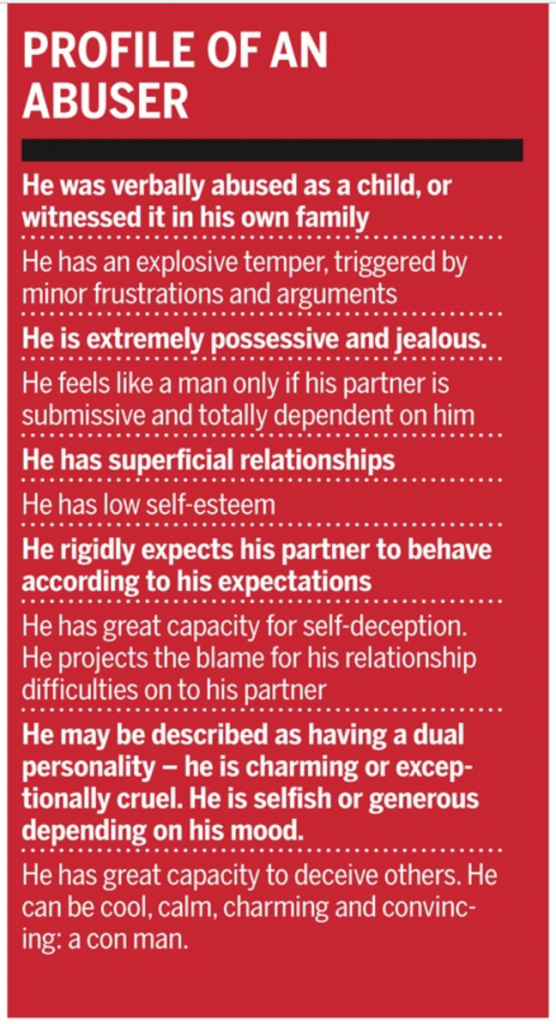How to spot emotional abuse, and break the cycle of silence.

Emotional abuse is often either unrecognised or downplayed by those it affects. As Judy Amuga Ndibo writes, this scourge does not discriminate on account of age, social and economic status, looks, intellect, achievements or nationality, while the majority of victims suffer in silence.
It is vital that women reading this gain insights into identifying emotional abuse in their own relationships or in those of their close friends, neighbours, colleagues or family members.
Here is a scene: Anita walks into the private hospital’s observation room to find a consulting doctor waiting to examine her. Anita is a beautiful, elegant lady, yet on closer look, her eyes display strained, red-eyed tiredness. She complains to the doctor of unusual chronic headaches, backache and loss of sleep. Tonight her headache, backache and dizziness have proved unbearable. The doctor takes her vital signs and notes with concern that her blood pressure reading is unusually high.
The doctor quickly asks her the all-important question: “Are you married or in a serious relationship?” Anita, as if on cue, bursts into tears. She confides about her husband, his serial infidelity, his neglect and the obvious lack of appreciation of her. Anita has fought battles with so many of her husband’s mistresses, enduring taunts, insults, cruelty and disrespect from him in equal measure. She is a woman living under enormous emotional strain. The doctor advises Anita to seek emotional help and prescribes sleeping tablets.
Hiding pain
There are a growing number of stories from women like Anita (not her real name). Many suffer emotional abuse in silence. They brave the world with a well-crafted image, hiding their pain behind smiles while their emotional scars bleed deeper.
According to Dr Sarah Scheckter, abused partners may feel depressed, less interested in their work or hobbies, have trouble sleeping, feel lonely, isolated, worthless and unattractive. They can feel very dependent on their partner, afraid, anxious and helpless. They feel their partner is unpredictable and begin to worry that no matter what they do their partner will not be happy.
You may hear an abused person talk about their partner’s anger and jealousy. She also cites name-calling, insults, threats, intimidation, coercion, isolation from friends/family, withholding of affection, restricting or monitoring a victim’s freedom to use their phone, computer or car, as examples of deep emotional abuse.
Abused partners may feel depressed, less interested in their work or hobbies, have trouble sleeping, feel lonely, isolated, worthless and unattractive.
Many women victims of emotional abuse who have quoted similar feelings to those cited above, were unaware of the fact that they were being abused. Many lament about living in perennial loneliness, being denied quality time, bonding and emotional love while their men lead an active social life outside their relationship and have no qualms about squandering their earnings with the ‘boys’ while the women are left to juggle finances at home.
Economically disempowered
Other women are put down and denied educational opportunities or told to decline promotions at work that could see them become economically empowered. Perhaps the most poignant accounts are from accomplished career women who have to deal with serial womanisers, sometimes who play away with their best friends or their household’s domestic help.
One professional and high-achieving woman tried to forgive her husband’s many infidelities – even after he made one of his mistresses pregnant. His excuse for his wandering eye, which she accepted, was that he cheated because she had gained weight or because she travelled a lot for her work.
Women are nurturing by nature, and often bear the greatest burden of trying to make a relationship work. Many women often endure abuse as they strive to change their man. Most times, women blame the abuse on themselves and opt to silently stay in unhappy relationships for fear of ridicule, stigma, or being tagged a failure or for not sustaining their relationship.
African women, in particular, come with their own further challenges. A long lineage of labels like “resilience”, “endurance”, “good at hiding pain”, ensures they remain perpetual victims.
Economically disadvantaged and rural women are even more vulnerable to rampant emotional abuse, which, unfortunately, by and large, is culturally accepted. It is even worse for women who cannot bear children. They are routinely regarded as being cursed.
Serious Effects
An emotional abuser is not easy to spot; they can be model citizens or respectable gentlemen in a community, our fathers, our brothers, friends or neighbours. In most cases, we can never tell and sadly the majority of victims will be in intimate relationships with the abusers and never report it, and sometimes never even know they are being emotionally abused until something serious happens such as the onset of unexplained health problems such as migraine, hypertension, ulcers, insomnia, chronic back and joint pains, or depression.
Even if treatment can be offered for these conditions, the real solution lies in finding a solution to the root cause: being a victim of emotional abuse.
Most times, women blame the abuse on themselves and opt to silently stay in unhappy relationships for fear of ridicule and stigma.
Especially sad are the women victims who choose to numb their pain and helplessness in drug and alcohol addiction, sleep medication dependency or other deviant behaviours. And for the children growing up in an abusive home, they do not experience a positive role model, and often become either victims or perpetrators of emotional abuse in the future themselves.
If you are reading this and are a victim of emotional abuse, first understand that it is not your fault! So seek the support that is needed unashamedly! Make peace with yourself, reclaim lost years and purpose to take practical, honest action.
Talk to a close friend, a trusted counsellor or a respected family member and slowly begin to regain your sense of self-value. Seek help and have courage – you are worth it!


















